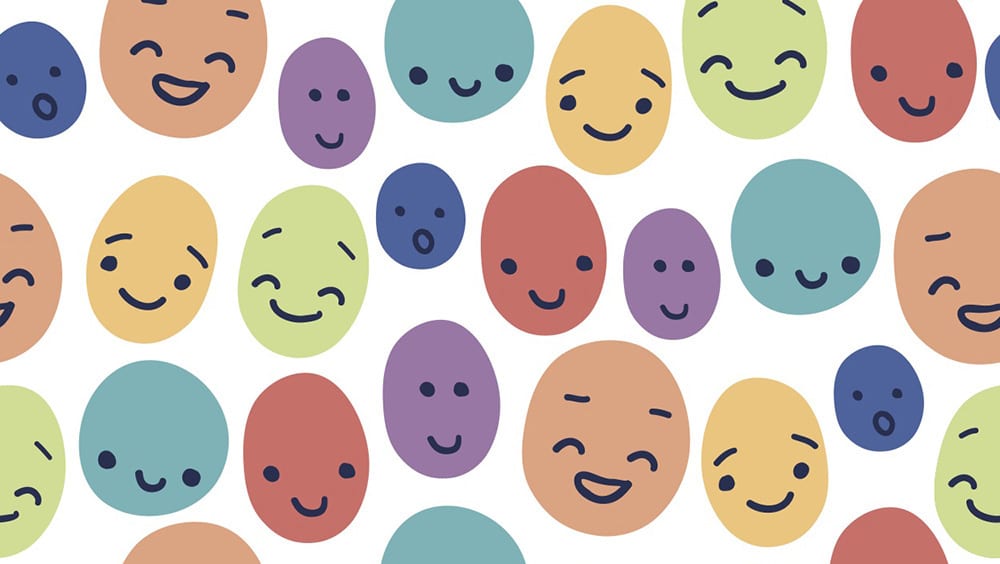Aristotle called those who took a joke too far “vulgar buffoons.” But those who could neither make nor take a joke he dubbed “boorish and unpolished.”
For those of us who would rather be neither a buffoon nor a boor, he thankfully offers a third option: ready wit .
I grew up with a decent dose of humor in my home. My dad loves a combination of slapstick comedy and wry wit. My mom sees the humor in life and has the endearing characteristic of being able to poke fun at herself, as well. I benefited from the best of both and grew up appreciating the fact that words are funny, and life is funny, too.
Early on, I learned why — or thought I did. We all have this thing called the funny bone or humerus. Yes, I confused the two until a chart in the doctor’s office set me straight. The humerus has nothing to do with humor, and the funny bone isn’t a bone at all. It was a huge disappointment. I preferred thinking that we have humor in our very bones.
Laughter
We need laughs. One way or another, it’s in our DNA. Different studies have varying results, but according to Gary Palmer (“The Power of Laughter”), children laugh around 400 times a day and adults about 15.
I think the kids have the right idea.
Laughter is part of living fully. True, genuine, heartfelt laughter encompasses the whole of our being. It goes hand in hand with compassion, empathy, creativity, joy.
In moments when we have a tendency to close down, humor is a way of opening up instead.
Once in a while, when I really feel like I’ve gotten nothing done in a day, I’ll write a list of everything I did do and then check it all off as if it was what I’d planned. It’s a way of viewing the same reality — a day run amok — through a gentler lens. It’s humor. It’s also self-compassion and helps me be more patient when other people don’t get things done either.
Sense of humor
Having a good sense of humor doesn’t mean being uproariously funny. It means being willing to view life a little differently — to find the good in surprising places and take ourselves a little less seriously. It’s a matter of perspective. I once heard it said that you can find a smile anywhere once you realize it’s the same as a frown — upside down.
Absurdity and humor go hand in hand. The element of surprise found in the discrepancy between that which is, and that which should be is what gets a laugh. Because vantage point is in the eye of the beholder, even those of us that aren’t naturally funny can nevertheless sharpen our sense of humor.
Our expectation that all things turn out the way we think they should is itself an absurdity. We simply don’t have that much control over life. A good sense of humor lets us accept this as a given in life, and yet see beyond it, knowing that our source of life and strength is greater than our insecurity.
Even my 6-year-old is learning this. She found a few worms the other day and made a little “home” for them, replete with dirt and bits of lettuce. The worms had the audacity to disappear overnight. Thankfully, they had been on the deck, so I wasn’t concerned about any surprise visitors in the house. But my daughter was in tears. I tried to crack a joke. “Listen, honey. It’s OK. Spring’s coming, so ‘wormer’ weather is on the way. You’ll find plenty more.” I found my little pun funnier than she did, but it made her smile through her tears. Mission accomplished.
Humor does more than relieve tensions and produces feel-good moments. It goes hand in hand with virtue and spirituality as well.
Virtues
When it’s time to talk about virtues in our house, I use a list of 52. I presume it was conveniently designed to focus on one virtue each week of the year, although that’s not quite how I use it. But I digress. Shortly after I’d introduced my kids to the list, one of my sons came to me and said, “You know that list of virtues? Which ones are really important and which ones are just kind of nice?” (As you can tell, we’re a house full of overachievers.)
I helped him prioritize without actually saying any could be tossed by the wayside. To me, integrity comes first because it’s foundational — all the other values presuppose integrity and flow from it. But joy is very high up there as well.
As an aside, Abraham Lincoln once used his humor to highlight his integrity. His political opponent, Douglas, accused him of being two-faced. His response: “If I were two-faced, would I be wearing this one?” A great example of wit, honesty and humility.
Laughter — the kind that lifts people up, not tears them down — comes when we are surprised by joy. Or, as G.K. Chesterton explains it, laughter is something uniquely human and indicates that we have “caught sight of some secret in the very shape of the universe hidden from the universe itself” — “The Everlasting Man.”
My daughter thinks that some animals laugh too. I’ll refrain from judgment on that point. Chesterton’s notion is valid either way. Laughter is something delightful. The secrets of the universe are a way of experiencing divine surprise operative in our own lives or the world around us. It’s one way that grace interrupts our day. As part of the prism of pure joy, laughter is not only authentically human but also points to the profound relationship between the human person and the Creator. And its depth — there’s always more to discover.
Joy
Pierre Teilhard de Chardin tells us: “Joy is the infallible sign of the presence of God.”
Joy is inseparable from Christianity. It’s one of the fruits of the Holy Spirit. It characterized Jesus’ life. The Gospels might not be full of funnies, but the Scriptures associate joy with Jesus at both the beginning and end of his life, hence, encompassing the whole of his presence on earth. On the eve of his birth, the angels announced his coming with tidings of great joy (cf. Lk 2:10 ). On the eve of his death, Jesus himself said, “I have told you this so that my joy may be in you and your joy may be complete. This is my commandment: love one another as I love you” (Jn 15:11-12 ).
By juxtaposing the idea of complete joy with the love of neighbor, Jesus points to the communal dimension of joy, not as an afterthought, but as something essential. This applies to humor as well. Remember Gary Palmer’s 400:15 ratio? Well, a different researcher, Rod A. Martin, suggests that the difference in laughs doesn’t really have to do with age per se, but with social interaction. Laughter is contagious — people are much more likely to laugh with another than to do so by themselves. So, not to worry — those of us in adulthood still stand a chance when it comes to healthy doses of laughter, especially if we focus on community. When you see something that makes you laugh and you pass it on, bringing laughter to another, you have no clue what that person is thinking or going through. But you have the opportunity to offer a bit of joy, and that never hurts.
St. Thomas More understood this, and prayed for it regularly: “Grant me O Lord, a good sense of humor. Allow me the grace to be able to take a joke to discover in life a bit of joy, and to be able to share it with others” (St. Thomas More, Prayer for Good Humor) .
When we share humorous moments with others, we surrender to joy together. And in sharing joy, we share God.
Ellen Mady writes from Pennsylvania.


